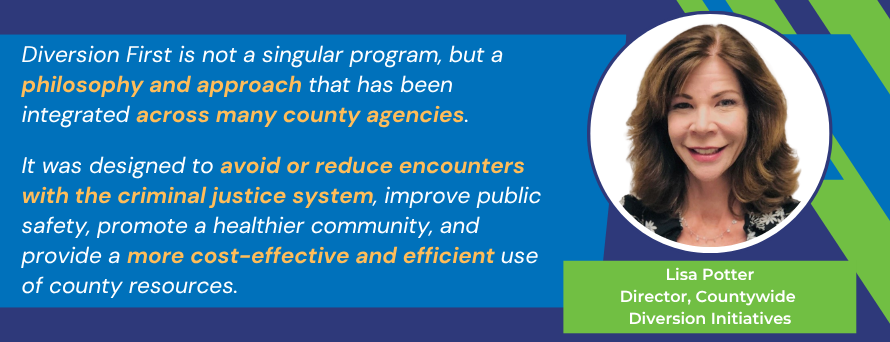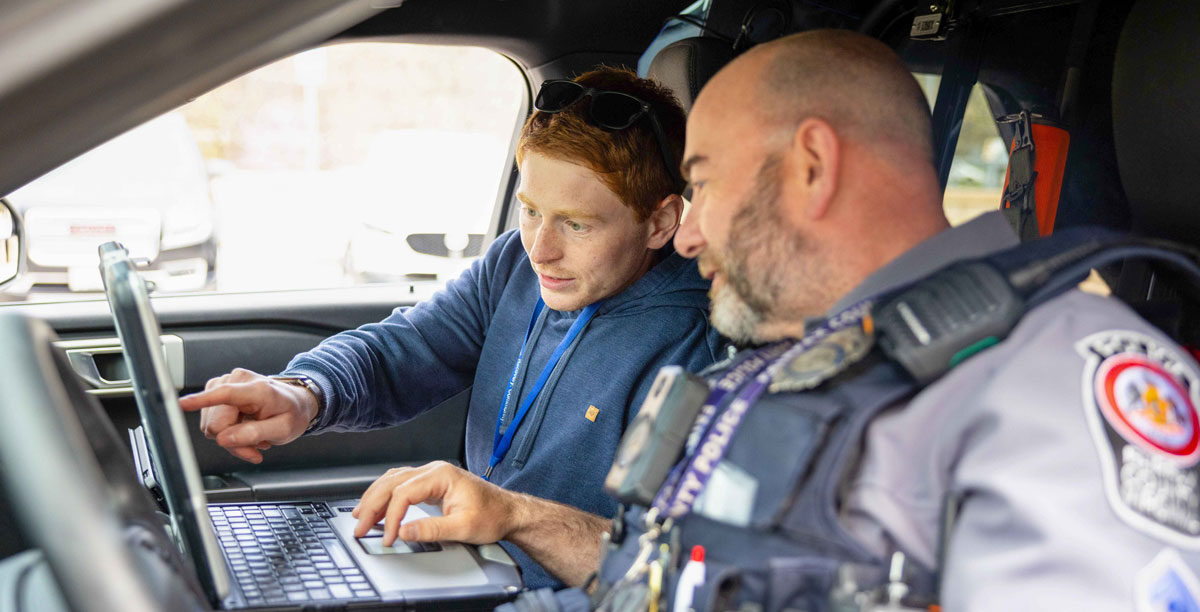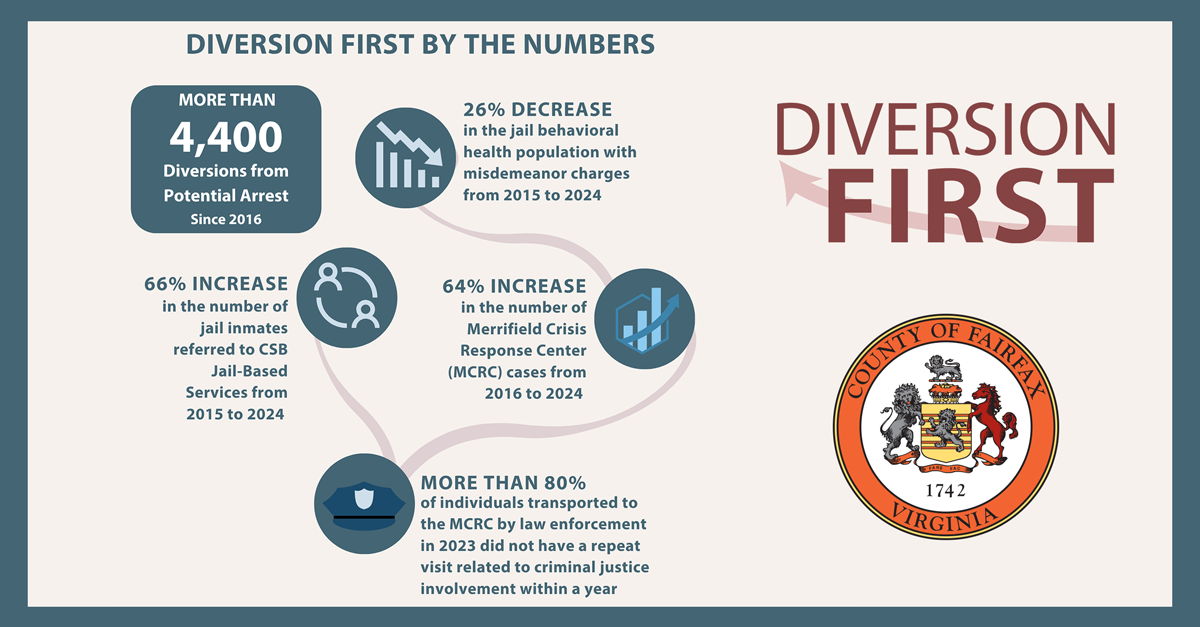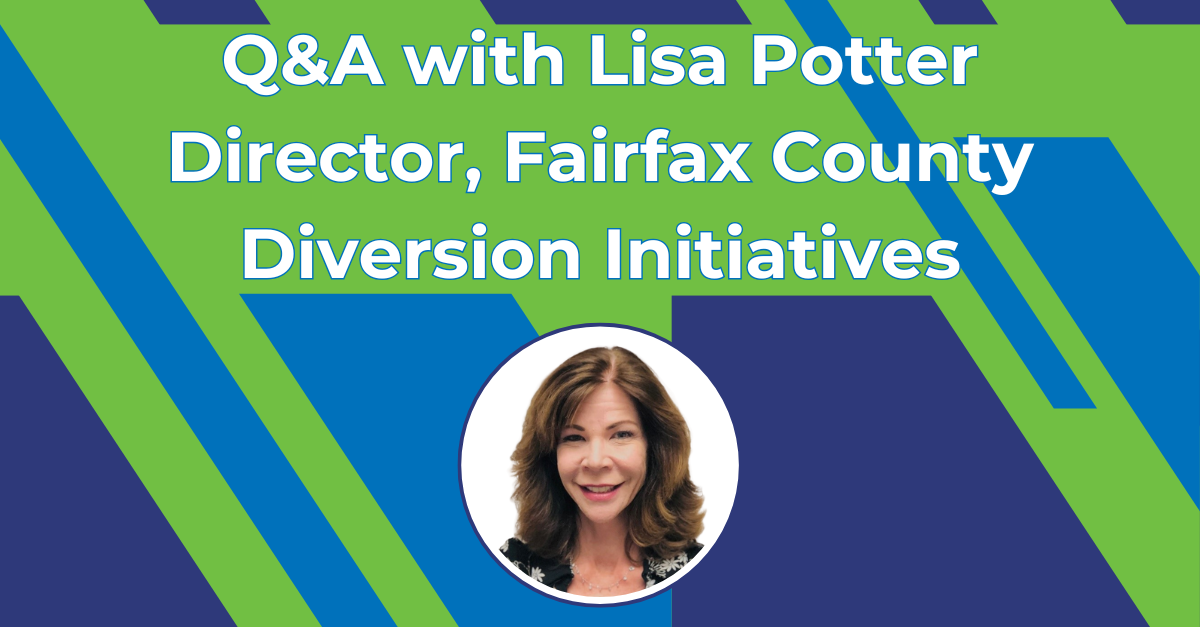Diversion First represents tremendous culture change and demonstrates that system transformation is possible, positively impacting individuals, families and the community as a whole. Staff involved in Diversion First are dedicated to providing incredible services, instilling hope and improving the lives of the people they serve.
- Lisa Potter, Director, Countywide Diversion Initiatives

What is Diversion First?
Diversion First is a cross-system initiative that offers alternatives to arrest and incarceration for people with mental illness, substance use challenges, and/or developmental disabilities who come into contact with the justice system for low-level offenses.
Diversion First is not a singular program. It is a philosophy and approach that has been integrated across many county agencies.
Launched in 2016, Diversion First was designed to avoid or reduce encounters with the criminal justice system, improve public safety, promote a healthier community, and provide a more cost-effective and efficient use of county resources.
Since then, Diversion First has used the nationally recognized Sequential Intercept Model (SIM) as a framework to inform strategies and community-based responses related to the involvement of people with behavioral health issues involved in the justice system.

The SIM identifies how people flow through the criminal justice system along six distinct intercept points, each with opportunities for intervention. Fairfax County offers services across this continuum, providing multiple points of access for services.
Diversion First represents tremendous culture change and demonstrates that system transformation is possible, positively impacting individuals, families and the community as a whole.
Staff involved in Diversion First are dedicated to providing incredible services, instilling hope and improving the lives of the people they serve.
What are some of the services and programs associated with Diversion First?
Since Diversion First launched, thousands of first responders (as well as magistrates, probation officers and dispatchers) have received Crisis Intervention Team and Mental Health First Aid training. This training provides necessary tools to understand behavioral health issues and de-escalate crisis situations.
The Merrifield Crisis Response Center (MCRC), located in the Sharon Bulova Center for Community Health, serves as a 24/7 crisis intervention assessment site where law enforcement officers can connect people with services in lieu of arrest. Onsite Crisis Intervention Team-trained police officers and deputy sheriffs can take custody of individuals under an emergency custody order and transport them to the MCRC when behavioral health services are needed.
Teams also respond to behavioral health crises in the community. In addition to Mobile Crisis Units (CSB), multidisciplinary teams, including the Co-Responder (CSB and Fairfax County Police Department) and Community Response Teams (CSB and Fire and Rescue Department), comprised of public safety and clinical staff respond to behavioral health needs. These needs can range from an immediate crisis response to services for individuals who have frequent public safety encounters. The CSB and Department of Public Safety Communications have also partnered to have clinicians onsite at the 911 Operations Center.

Diversion First also provides opportunities for intervention through the justice system. Individuals booked at the Adult Detention Center (ADC) are screened using standardized tools to identify behavioral health issues. The CSB provides an array of behavioral health services within the ADC, including assessment, crisis intervention, medication evaluation and case management.
The Sheriff’s jail-based addiction treatment and recovery program, Striving to Achieve Recovery (STAR), is led by certified peer recovery specialists with support from jail-based behavioral health and medical teams. Medication for opioid use disorders is also offered in the ADC. Jail-based teams provide post-release/re-entry services such as linkages to treatment, health care and housing. In addition, diversion engagement services help people to break the cycle of incarceration and psychiatric crisis.
The court system is also a key Diversion First partner. The Supervised Release Program provides intensive pre-trial supervision in the community, providing accountability and support while reducing the number of days spent in jail. Three specialty dockets, the Veterans Treatment Docket, Recovery Court and Mental Health Docket, provide diversion through an intensive, structured process that integrates treatment and court supervision.
Additionally, Diversion First includes community-based behavioral health treatment, peer recovery support, and housing to provide person-centered care, a connection to recovery, and a pathway out of the justice system.
What are some key outcomes?
-
More than 4,400 Diversions from potential arrest since 2016
-
26% decrease in the jail behavioral health population with misdemeanor charges from 2015 to 2024
-
64% increase in the number of Merrifield Crisis Response Center (MCRC) cases from 2016 to 2024
-
More than 80% of individuals transported to the MCRC by law enforcement in 2023 did not have a repeat visit related to criminal justice involvement within a year
-
66% increase in the number of jail inmates referred to CSB Jail-Based Services from 2015 to 2024

What is an example of a Diversion First success?
Diversion First has evolved significantly since 2016. Every day, there are powerful examples of successful diversions from potential arrest: crisis response and intervention by community-based teams; behavioral health, recovery services and life-saving medications provided in the ADC; connections made through peer support; engagement with the most vulnerable people who have previously been unwilling to seek services; and Specialty Dockets that support people in making different choices.
The 2024 Diversion First Annual Report offers many examples of how individuals’ lives have been positively impacted by their participation in various programs.
National Recognition
Fairfax County was recently highlighted by the National Association of Counties for its successes with Diversion First. Fairfax was designated a Stepping Up Innovator County in 2019—one of approximately 50 in the country. (Stepping Up, a national initiative to reduce the number of people with mental illnesses in jails, is implemented in Fairfax County as Diversion First.)
For media inquiries, contact CSBCommunications@fairfaxcounty.gov.


